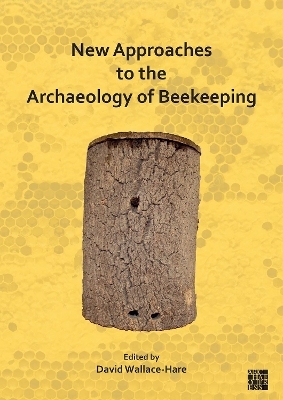
New Approaches to the Archaeology of Beekeeping
Archaeopress (Verlag)
978-1-78969-993-7 (ISBN)
New Approaches to the Archaeology of Beekeeping aims to take a holistic view of beekeeping archaeology (including honey, wax, and associated products, hive construction, and participants in this trade) in one large interconnected geographic region, the Mediterranean, central Europe, and the Atlantic Façade. Current interest in beekeeping is growing because of the precipitous decline of bees worldwide and the disastrous effect it portends for global agriculture. As a result, all aspects of beekeeping in all historical periods are coming under closer scrutiny. The volume focuses on novel approaches to historical beekeeping but also offers new applications of more established ways of treating apicultural material from the past. It is also keenly interested in helping readers navigate the challenges inherent in studying beekeeping historically. The volume brings together scholars working on ancient, medieval, early modern, and ethnographic evidence of beekeeping from a variety of perspectives. In this sense it will serve as a handbook for current researchers in this field and for those who wish to undertake research into the archaeology of beekeeping.
David Wallace-Hare (PhD University of Toronto) is an environmental historian of ancient and medieval beekeeping, mining, and forest management in western Europe. He is currently a Postdoctoral Research Associate at the University of Exeter on the NERC-funded project MEMBRA (Understanding Memory of Treescapes for Better Resilience and Adaptation).
Preface – David Wallace-Hare (San Diego State University) ;
Acknowledgements ;
1. A New Approach to the Study of Ancient Greek Beekeeping – Georgios Mavrofridis (University of the Aegean) ;
2. Smoke and Bees: From Prehistoric to Traditional Smokers in Greece – Sophia Germanidou (University of Newcastle) ;
3. Potters and Beekeepers: Industrial Collaboration in Ancient Greece – Jane Francis—Concordia University (jane.francis@concordia.ca) ;
4. Etruscan 'Honey Pots': Some Observations on a Specialised Vase Shape – Paolo Persano (Scuola Normale Superiore, Pisa) ;
5. Palynological Insights into the Ecology and Economy of Ancient Bee-Products – Lorenzo Castellano (Institute for the Study of the Ancient World, New York University); Cesare Ravazzi, Roberta Pini, Giulia Furlanetto, Franco Valoti (Research Group Vegetation, Climate and Human Stratigraphy, Laboratory of Palynology and Paleoecology, Institute of Environmental Geology and Geoengineering, National Research Council, Italy) ;
6. La apicultura en el ager de Segóbriga-Cuenca, España – Jorge Morín (Departamento de Arqueología, Paleontología y Recursos Culturales de AUDEMA); Rui Roberto de Almeida (Investigador da UNIARQ-Universidade de Lisboa / Câmara Municipal de Loulé); and Isabel Sánchez Ramos (Universidad Pablo de Olavide de Sevilla) ;
7. Beekeeping and Problematic Landscapes: Beekeeping and Mining in Roman Spain and North Africa – David Wallace-Hare (San Diego State University) ;
8. Evidence of Dalmatian Beekeeping in Roman Antiquity – Kristina Jelincic Vučković, Ivana Ožanić Roguljić (Institute of Archaeology, Zagreb, Croatia); and Emmanuel Botte (MMSH, Centre Camille Jullian Aix-en-Provence Cedex) ;
9. Ancient Rock-cut Apiaries in the Mediterranean Area: Some Case Studies – Roberto Bixio (Hon. Inspector for Archaeology, sector Artificial Cavities, Italian Ministry of Cultural Heritage); Andrea Bixio (Centro Studi Sotterranei, Genoa); Andrea De Pascale (Museo Archeologico del Finale /Istituto Internazionale di Studi Liguri, sezione Finalese Finale Ligure/Savona) ;
10. Appiaria vel in civitate vel in villa: Bees and Cities in the Early Medieval West – Javier Martínez Jiménez (Faculty of Classics/Churchill College, University of Cambridge) ;
11. The Production and Trade of Wax in North-Eastern Iberia, XIV-XVI C: The Case of Catalonia – Lluís Sales i Favà (King’s College London) and Alexandra Sapoznik (King’s College London) ;
12. Del panal a la mesa: La miel en la Corona de Aragón (siglos XIV-XV) – Pablo José Alcover Cateura (Food Observatory, ODELA, Universitat de Barcelona) ;
13. Honey and Wax in Medieval Tyrol on the Basis of Tyrolean Land Registers (Urbaria) and Books of Accounts – Barbara Denicolò (University of Salzburg) ;
14. Early Irish Law on Beekeeping, with Particular Reference to Bechbretha ‘Bee-Judgements’ – Fergus Kelly (Dublin Institute for Advanced Studies) ;
15. Arqueología de la apicultura en la Asturias preindustrial – Joaquín López Álvarez (Muséu del Pueblu d’Asturies) ;
16. Approches de l’Archéologie: L’apiculture insolite du nord de l’Espagne – Robert Chevet (Apistoria) ;
17. Historical Beekeeping in Northern Portugal: Between Traditional Practices and Innovation in
Movable Frame Hives – Teresa Soeiro (CITCEM)
| Erscheinungsdatum | 04.01.2022 |
|---|---|
| Zusatzinfo | 137 figures, 1 map, 11 tables, 4 plates (colour throughout) |
| Verlagsort | Oxford |
| Sprache | englisch; französisch; spanisch |
| Maße | 205 x 290 mm |
| Gewicht | 1006 g |
| Themenwelt | Geisteswissenschaften ► Archäologie |
| Naturwissenschaften ► Biologie ► Ökologie / Naturschutz | |
| Sozialwissenschaften ► Soziologie | |
| ISBN-10 | 1-78969-993-2 / 1789699932 |
| ISBN-13 | 978-1-78969-993-7 / 9781789699937 |
| Zustand | Neuware |
| Haben Sie eine Frage zum Produkt? |
aus dem Bereich


